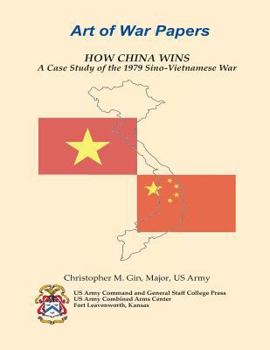HOW CHINA WINS A Case Study of the 1979 Sino-Vietnamese War
The purpose of this study is to examine whether or not China won astrategic victory in its invasion of Vietnam in 1979, and what relevancethat victory may have on today's study of Chinese strategy and militarythought. Significant studies have focused on the regional issues that ledChina and Vietnam to war in February 1979. This study instead focuses onChina's grand strategic framing of the war and why China may interpretits involvement as a strategic victory.In the aftermath of the problems of political succession at the laterstages of the Mao Zedong (Mao Tse-Tung) era and the domestic socialturmoil of the Cultural Revolution of the 1960s and 1970s, Deng Xiaoping(Teng Hsiao-Ping) emerged as China's paramount leader. In February1979, fewer than two years after he assumed his role as Vice Premier, andonly months after normalizing relations with the United States, Deng'sgovernment decided to wage a limited war against Vietnam. China usedVietnam's 1978 invasion into Cambodia as a jus ad bellum, thus promptingChina to conduct a cross-border invasion of its own in order to aid itspolitical ally in Cambodia. With nearly 450,000 mobilized soldiers, Chinabegan a limited war with strategic implications.1 After three weeks offierce fighting, one Chinese veteran unofficially admits to roughly 32,000men killed in action, with countless more wounded.2 Several notablescholars argue that the Chinese achieved only some of their operationalobjectives at great cost to the People's Liberation Army (PLA), and at acomplete detriment to the political work system that embodied its forces atthe time.3 Though tactical and operational inadequacies became apparentin the aftermath of the three-week fight, China still claimed strategic victory.Throughout the next decade, China and Vietnam continued their hostilitieson a lesser scale, finally ending when Vietnam withdrew troops fromCambodia in 1989 and signed a treaty normalizing the border in 1991.This study explores whether or not the Chinese were successful inusing limited war in 1979 to achieve their strategic political goals, bothdomestically and internationally. What was the decision-making processthat led Deng Xiaoping to calculate that the benefits of going to war with Vietnam outweighed the risks? Since the late 1960s, China viewed the Union of Soviet Socialist Republic's (USSR) ideological and materiel support to Vietnam as a threat to its southern periphery. China interpreted the USSR-Vietnam relationship as a growing encroachment on its interests- real or imagined. Furthermore, China feared encirclement by the Soviet Union through proxy states, especially after Vietnam joined the Soviet-led Council of Mutual Economic Assistance and signed a Treaty of Friendship and Cooperation with the Soviet Union in November 1978
Format:Paperback
Language:English
ISBN:154311282X
ISBN13:9781543112825
Release Date:January 1
Publisher:Createspace Independent Publishing Platform
Length:104 Pages
Weight:0.58 lbs.
Dimensions:0.2" x 8.5" x 11.0"
Related Subjects
HistoryCustomer Reviews
0 rating





